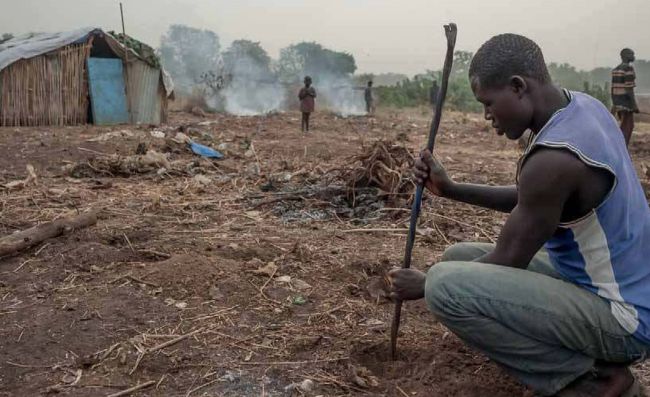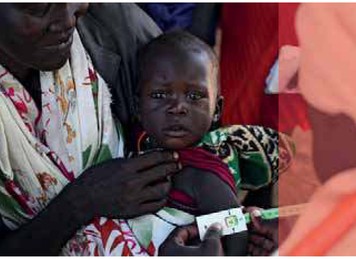Thomas Baldwin reports on the man-made crisis which has led to famine in the world's newest country – and of the seeds of hope being planted for the future by the Church of Scotland.
ON Monday February 20, the UN declared a famine in parts of Unity State, in the world’s newest country of South Sudan. Aid charities, issuing the distressingly-familiar disaster appeals, warned that 100,000 people are facing starvation in Unity, and a further million people are classified as being ‘on the brink of famine’.
This famine has not sprung from an ‘act of God’ – extreme weather or natural disaster – but from three years of escalating conflict between supporters of the President Salva Kiir, and former Vice President Riek Machar. More than three million people – a quarter of the population – have been displaced, many have fled to neighbouring countries, and the economy has collapsed.
“The famine is man-made,” says Jennie Chinembiri, Africa and Caribbean Secretary for the World Mission Council of the Church of Scotland.
“People can’t grow things, because soldiers or rebels would just come and loot it, and many of them are hiding in swamps so probably areas that aren’t going to be useful for growing anyway.
“The movement of people and goods is very difficult, and that means prices go up, and there’s no money.
During a visit to Kenya in March, Jennie met with senior figures from the Presbyterian Church of South Sudan, including the Moderator of the General Assembly, the Rev Peter Gai Lual Marrow. She adds: “Peter says this is the worst he’s ever seen – and he lived through decades of civil war.

Photo: iStock / Juba, South Sudan – Refugee digs a hole for a construction of new hovel in displaced persons camp.
“The president has now declared he wants to increase the number of states from 28 to 32, prior to the fighting there were only 10, but this is intensifying the conflict because each state will be linked to a tribe and therefore a language. Instead of a common language like Arabic or English, people will just speak their tribal language. So the country will become more fractured.
“The vice president has left the country, and there has been a vacuum, but it seems the rebels have identified a new figurehead. It seems like quite a hopeless situation.
“The church used to have the ear of the president: the Moderator was part of the Addis Ababa peace negotiations [in 2014]. Now, they have been told in theory they are still there, but when they try to get a meeting with the president it doesn’t happen.”
The church has a relief department called the PRDA (Presbyterian Relief and Development Agency), which is providing food and other essentials (and which you can support via the World Mission Council: see below).
However, there is little hope for an end to the humanitarian crisis while the violence goes on. “Peace is the key,” says Jennie, and the Church of Scotland is involved in working with members of the church and community to both provide trauma counselling and train them as mediators. The work started in 2015 with a visit from the then Moderator of the General Assembly, the Very Rev Dr John Chalmers, who continues to be involved.

Photo: Andreea Campeanu / DEC
We can, and must, do more.
Jennie says: “We have already done one stage in Nairobi, looking at mediation skills alongside the trauma they have been through and working with individuals to help them. Many of them have suffered and seen huge amounts of death and destruction.
“What we are hoping to do over the next 18 months is to have three different meetings: one in Nairobi, where we start on the first stages of training them to be mediators.
“Then we’re hoping to bring leaders of different departments and presbyteries to Scotland, where we will do one on one counselling with them, but also John is hoping to lead a pilgrimage element to the visit, taking them to places within Scotland like Iona.
“So it’s a holistic approach, trying to bring some spiritual healing to them as well as training them.
“The overall aim is to work with the South Sudanese so a group of them eventually become trainers of mediators.”
The hope is to link the visitors into church congregations while they are in Scotland. Jennie added: “We’d like to hear from congregations interested in knowing more about that or wanting to get involved. If the Church of Scotland as a wider body can get involved that would be a really positive development.”
Dr Chalmers, Principal Clerk to the General Assembly, said after the declaration of famine: “There has been so much sad news out of South Sudan, but this is the saddest news I have heard since returning from Juba.
“I spoke then of the complete breakdown in the rhythm of life – crops had died in the fields and cultivation had been interrupted by both war and drought. Now is the time for a passionate and generous humanitarian response. My abiding prayer is that the seeds of this year’s harvest can be planted alongside the much-needed seeds of reconciliation and peace.
“I am humbled, but inspired to be part of a Church of Scotland initiative which is working with the Presbyterian Church of South Sudan on the training of peacemakers and the healing of trauma. I will continue to contribute to this work, but first we need to save the lives of the people who need daily bread as much as they need to be saved from the trial and suffering of war.”
The Christian NGOs working with partners in the country warned that the situation could get worse.
Speaking from Juba, Christian Aid’s South Sudan country manager Rosie Crowther said: “Tragically, this crisis was utterly preventable. This declaration of famine in Unity State is a harsh wake-up call. The international community must do more to address the plight of the South Sudanese people. The situation will continue to deteriorate rapidly if we don’t act now. We can, and must, do more.”
Donald Mavunduse, Tearfund’s Head of East and Southern Africa Team, said: “This is a desperate situation for South Sudan to be facing and we are worried that it is only going to get worse in the coming months with famine spreading more widely. Already, 4.9m people, more than 40 per cent of the population, are in need of urgent food, clean water and nutrition assistance. Inflation has rocketed to between 800 and 900%, so buying food has become impossible for ordinary people, and there is little sign of the conflict coming to an end.”
Donations to the PRDA’s relief efforts can be sent to the World Mission Council at 121 George Street, Edinburgh EH2 4YN; donations should be clearly marked for humanitarian work in South Sudan and cheques made payable to the ‘Church of Scotland’. Any church interested in being involved with the visit from South Sudan should also contact World Mission.
You can also donate to help South Sudan at
www.christianaid.org.uk
and
www.tearfund.org